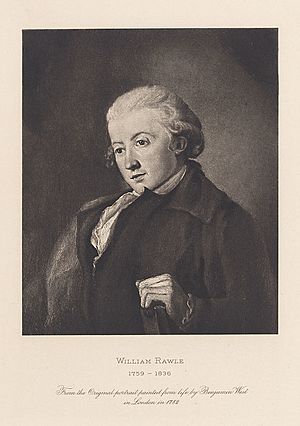William Rawle facts for kids
Quick facts for kids
William Rawle
|
|
|---|---|

Rawle, after a portrait by Benjamin West
|
|
| U.S. District Attorney for Pennsylvania | |
| In office 1791–1800 |
|
| Preceded by | Office created |
| Succeeded by | Jared Ingersoll |
| Personal details | |
| Born | April 28, 1759 Philadelphia, Province of Pennsylvania, British America |
| Died | April 12, 1836 (aged 76) Philadelphia, Pennsylvania, United States |
| Relations | Francis Rawle (great-grandfather) |
| Children | 12 |
| Parents | Francis Rawle Rebecca Warner |
William Rawle was an important American lawyer who lived from 1759 to 1836. He was a key figure in Philadelphia, Pennsylvania. In 1791, he became the United States district attorney for Pennsylvania.
He also helped start the Historical Society of Pennsylvania and was its first president. He led the Pennsylvania Abolition Society, which worked to end slavery. For 40 years, he was a trustee at the University of Pennsylvania.
Contents
Early Life and Education
William Rawle was born in Philadelphia. He went to school at the Friends' Academy. His family were Quakers, a religious group known for their peaceful beliefs. They came from Cornwall, England.
His great-grandfather, Francis Rawle, even wrote some early books that were printed by the famous Benjamin Franklin!
William Rawle's Career
Rawle studied law in New York and in London, England. He became a lawyer in 1783. That same year, he started his own law firm in Philadelphia. This firm, now called Rawle & Henderson LLP, is the oldest law firm in the United States that has been open continuously.
In 1791, President Washington chose Rawle to be the United States district attorney for Pennsylvania. In this role, he was involved in legal actions against the leaders of the Whiskey Rebellion. This was a protest by farmers against a new tax on whiskey.
Contributions to Law and Society
Rawle also worked as a lawyer for the First Bank of the United States. In 1830, he helped to update the laws of Pennsylvania. He was very interested in science, helping others, and education. He was active in many groups that supported these causes.
Besides being the first president of the Historical Society of Pennsylvania, he was also the president of the Pennsylvania Abolition Society. This group worked to end slavery and help formerly enslaved people. He was also a member of the American Philosophical Society and served as a trustee for the University of Pennsylvania for 40 years.
Personal Life and Family
In 1783, William Rawle married Sarah Coates Burge. They had twelve children together.
William Rawle, Jr., one of his sons, also became a lawyer. He married Mary Anna Tilghman, whose grandfather was a well-known judge named Benjamin Chew.
Rawle passed away on April 12, 1836, in Philadelphia, Pennsylvania.
Rawle's Descendants
Through his son William, William Rawle was the grandfather of attorney William Henry Rawle. William Henry Rawle's daughter, Mary Cadwalader Rawle Jones, became a novelist. She was married to Frederic Rhinelander Jones, who was the brother of the famous novelist Edith Wharton. Mary and Frederic's daughter, Beatrix Farrand, became a renowned landscape architect.
Published Works
William Rawle wrote several important books and essays during his lifetime. These works covered topics like law, history, and agriculture.
- Vindication of Rev. Mr. Heckewelder's 'History of the Indian Nations' (1818)
- A View of the Constitution of the United States (1825; second edition, 1829)
- Discourse on the Nature and Study of the Law (1832)
- "An Address before the Philadelphia Society for Promoting Agriculture" (1819)
- "Two Addresses to the Associated Members of the Bar of Philadelphia" (1824)
- "The Study of the Law" (1832)
- "Biographical Sketch of Sir William Keith"
- "A Sketch of the Life of Thomas Mifflin"
- "Essay on Angelic Influences"
Images for kids
 | John T. Biggers |
 | Thomas Blackshear |
 | Mark Bradford |
 | Beverly Buchanan |


